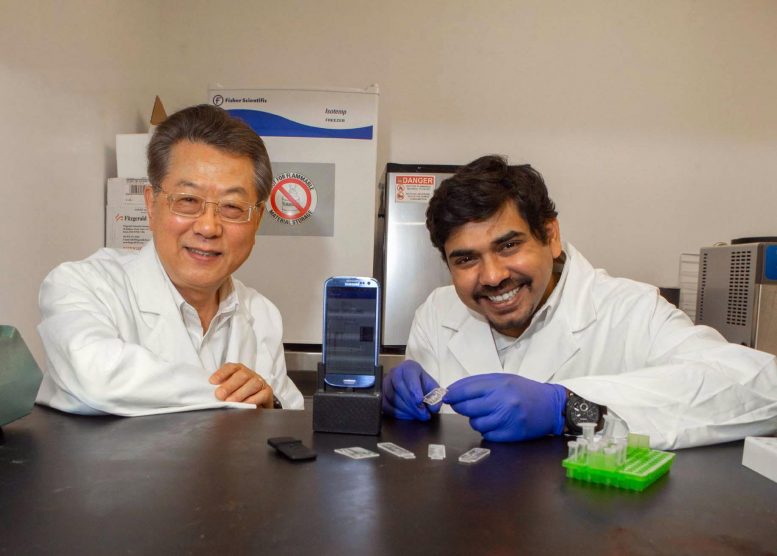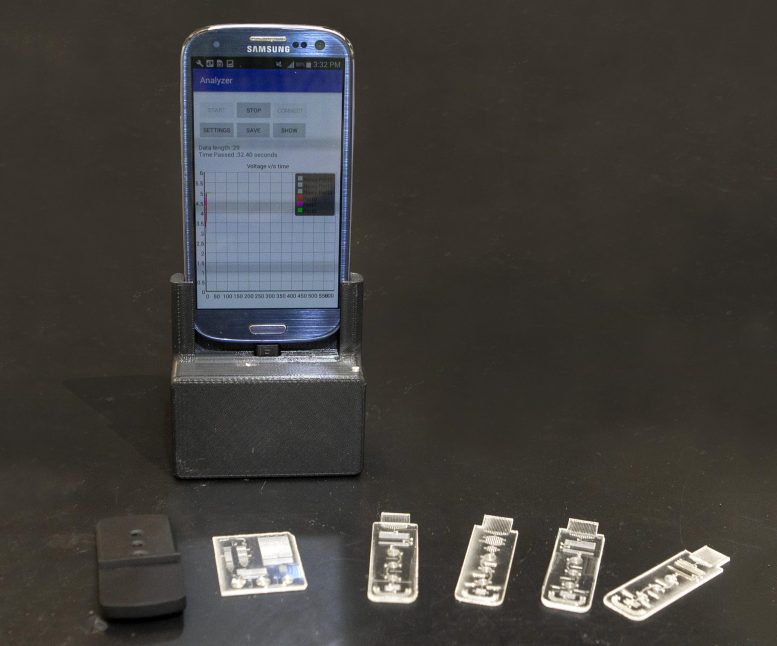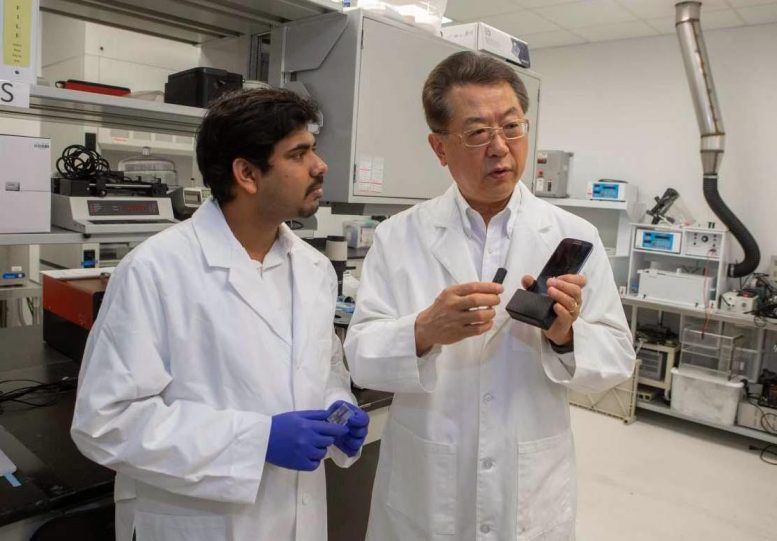BREAKTHROUGH! US Biotech Experts Create Portable Smartphone Lab That Can Diagnose Covid-19 Coronavirus And Other Viruses like HIV in Seconds
Source: Thailand Medical News Feb 12, 2020 5 years, 2 months, 2 weeks, 3 hours, 32 minutes ago
In the midst of the
Covid-19 coronavirus epidemic a couple of innovative bio engineers and medical doctors from the University of Cincinnati have created a tiny portable lab that plugs into any smartphone, connecting it automatically to a doctor’s office through a custom app they developed.
 University of Cincinnati engineering professor Chong Ahn, left, and graduate student Sthitodhi Ghosh
University of Cincinnati engineering professor Chong Ahn, left, and graduate student Sthitodhi Ghosh
created a portable lab that plugs into your smartphone to provide point-of-care testing. The results
are transmitted to your doctor via a custom app. Credit: Joseph Fuqua II/UC Creative Services
The
diagnostic “lab”, which is the size of a credit card, can diagnose infectious diseases such as the
Covid-19 coronavirus, HIV, malaria, or Lyme disease or countless other viruses and bacteria strains.
All a patient need to do is simply puts a single-use plastic lab chip into his or her mouth then plugs that into a slot in the box to test the saliva.
 UC professor Chong Ahn developed a portable lab that plugs into your smartphone to diagnose diseases
UC professor Chong Ahn developed a portable lab that plugs into your smartphone to diagnose diseases
like malaria or coronavirus. The results are transmitted to your doctor over a custom app UC developed.
Credit: Joseph Fuqua II/UC Creative Services
The
diagnostic medical device automatically transmits results to the patient’s doctor through a custom app UC created for nearly instant results.
University of Cincinnati Professor Chong Ahn and his research team used the smartphone
medical device to test for malaria. But the device could be used for smart point of care testing for countless chronic or infectious diseases or even to measure hormones related to stress.
 University of Cincinnati engineering professor Chong Ahn, right, and UC graduate student Sthitodhi Ghosh
University of Cincinnati engineering professor Chong Ahn, right, and UC graduate student Sthitodhi Ghosh
discuss the portable lab they created that plugs into a smartphone to test for infectious diseases .
Credit: Joseph Fuqua II/UC Creative Services
Professor Chong Ahn told
Thailand Medical News, “Right now it takes several hours or even days to diagnose in a lab, even when people are showing symptoms. The disease can spread,”
The research study an
d development was published in the Nature journal Microsystems & Nanoengineering.
The research team created a novel lab chip that uses natural capillary action, the tendency for a liquid to adhere to a surface, to draw a sample down two channels called a “microchannel capillary flow assay.” One channel mixes the sample with freeze-dried detection antibodies. The other contains a freeze-dried luminescent material to read the results when the split samples combine again on three sensors.
Professor Ahn said the
medical device is accurate, simple to use and inexpensive.
Professor Ahn added, “The performance is comparable to laboratory tests. The cost is cheaper. And it’s user-friendly. We wanted to make it simple so anyone could use it without training or support.”
University of Cincinnati doctoral student Dr Sthitodhi Ghosh, the study’s lead author, said the biggest advancement in the device is in the novel design of its tiny channels that naturally draw the sample through the sensor arrays using capillary flow. Professor Ahn is Ghosh’s Ph.D. advisor.
Dr Ghosh added, “The entire test takes place on the chip automatically. You don’t have to do anything. This is the future of personal healthcare.”
The
medical device has a variety of applications for diagnosing or monitoring viruses or other diseases, and even hormone levels.
The research team is already working with other researchers and also diagnostic companies to get the device rolled out by a fortnight for usage in the current
coronavirus epidemic.
The patented device is already in the process of getting all necessary regulatory issues cleared both in Europe and the US.
Reference: “A new microchannel capillary flow assay (MCFA) platform with lyophilized chemiluminescence reagents for a smartphone-based POCT detecting malaria” by Sthitodhi Ghosh, Kashish Aggarwal, Vinitha T. U., Thinh Nguyen, Jungyoup Han and Chong H. Ahn, 27 January 2020, Microsystems & Nanoengineering.
DOI: 10.1038/s41378-019-0108-8
For latest developments and news about the Covid-19 virus or about coronavirus research
, the coronavirus epidemic
or the Thailand Coronavirus scenario, keep on checking at: https://www.thailandmedical.news/articles/coronavirus 

